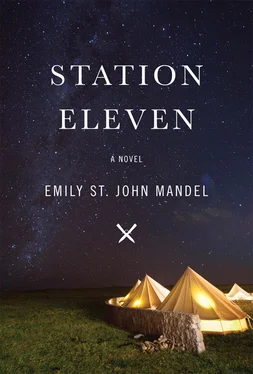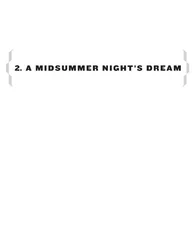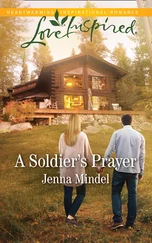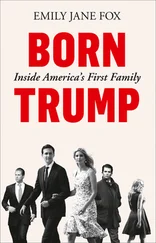“Have faith,” he whispered. “We’ll find them.”
Resort hotels stood along the lakeshore, the windows mostly broken and their shards reflecting the sky. Trees pushed up through the parking lots between rusted cars. Kirsten and August abandoned their suitcases, the wheels too loud on rough pavement, made bundles out of bedsheets and carried the supplies over their shoulders. After a mile or two they saw a sign with a white airplane hanging askew over an intersection, an arrow pointed toward the center of town.
Severn City had been a substantial place once. There were commercial streets of redbrick buildings, flowers riotous in planters, and the roots of maple trees disrupting the sidewalks. A flowering vine had taken over most of the post office and extended across the street. They walked as silently as possible, weapons in hand. Birds moved in and out of broken windows and perched on sagging utility wires.
“August.”
“What?”
“Did you just hear a dog bark?”
Just ahead was the overgrown wilderness of a municipal park, a low hill rising beside the road. They climbed up into the underbrush, moving quickly, threw their bundles aside and crouched low. A flash of movement at the end of a side street: a deer, bounding away from the lakeshore.
“Something startled it,” August whispered. Kirsten adjusted and readjusted her grip on a knife. A monarch butterfly fluttered past. She watched it while she listened and waited, wings like bright paper. A faint buzz of insects all around them. She heard voices now, and footsteps.
The man who appeared on the road was so dirty that Kirsten didn’t immediately recognize him, and when she did she had to stifle a gasp. Sayid was gaunt. He moved slowly. There was blood on his face, an eye swollen shut. His clothes were filthy and torn, several days’ beard on his face. Two men and a boy followed a few paces behind him. The boy carried a machete. One of the men carried a sawed-off shotgun, the barrel pointed at the ground. The other held a bow, half-drawn, an arrow at the ready and a quiver on his back.
Kirsten, moving very slowly, drew a second knife from her belt.
“I have the gunman,” August whispered. “Get the archer.” His fingers closed around a stone the size of his fist. He rose and sent it sailing in an arc over the road. The stone crashed into the wall of a half-collapsed house and the men started, turning toward the sound just as August’s first arrow caught the gunman in the back. Kirsten was aware of footsteps receding, the boy with the machete running away. The archer drew his bow and an arrow whistled past Kirsten’s ear, but the knife had already left her hand. The archer sank to his knees, staring at the handle protruding from between his ribs. A flock of birds rose up above the rooftops and settled into the sudden quiet.
August was cursing under his breath. Sayid knelt on the road, his head in his hands. Kirsten ran to him and held his head to her chest. He didn’t resist. “I’m so sorry,” she whispered, into his blood-caked hair, “I’m so sorry they hurt you.”
“There’s no dog,” August said. His jaw was clenched, a sheen of sweat on his face. “Where’s the dog? We heard a dog bark.”
“The prophet’s behind us with the dog,” Sayid whispered. “He’s got two men with him. We split up to take different roads about a half mile back.” Kirsten helped him to his feet.
“The archer’s still alive,” August said.
The archer was lying on his back. His eyes followed Kirsten, but he made no other movement. She knelt beside him. He’d been in the audience when they’d performed A Midsummer Night’s Dream at St. Deborah by the Water, applauding in the front row at the end of the performance, smiling, his eyes wet in the candlelight.
“Why did you take Sayid?” she asked him. “Where are the other two?”
“You took something that belongs to us,” the man whispered. “We were going to do a trade.” Blood was spreading rapidly over his shirt and dripping down the creases of his neck, pooling beneath him.
“We took nothing. I have no idea what you’re talking about.” August was going through the men’s bags. “No ammunition for the gun,” he said, disgusted. “And it was unloaded.”
“The girl,” Sayid said. His voice was a dry rasp. “He’s talking about the stowaway.”
“The fifth bride,” the archer whispered. “It was my duty. She was chosen.”
“Eleanor?” August looked up. “That scared little kid?”
“She’s the property of the prophet.”
“She’s twelve years old,” Kirsten said. “You believe everything the prophet says?”
The archer smiled. “The virus was the angel,” he whispered. “Our names are recorded in the book of life.”
“Okay,” Kirsten said. “Where are the others?” He only stared at her, smiling. She looked at Sayid. “Are they behind us somewhere?”
“The clarinet got away,” Sayid said.
“What about Dieter?”
“Kirsten,” Sayid said softly.
“Oh god,” August said. “Not Dieter. No.”
“I’m sorry.” Sayid covered his face with his hands. “I couldn’t …”
“And behold,” the archer whispered, “there was a new heaven and a new earth, for the old heaven and the old earth had passed away.” The color was draining from his face.
Kirsten wrenched her knife from the archer’s chest. He gasped, the blood welling, and she heard a gurgle in his throat as his eyes dimmed. Three, she thought, and felt immensely tired.
“We heard a whimpering in the forest,” Sayid said. He walked slowly, limping. “That night on patrol. We were about a mile from the Symphony, about to turn back, and there was a sound coming from the bushes, sounded like a lost child.”
“A ruse,” August said. He had a glazed look when Kirsten glanced at him.
“So like idiots we went to investigate, and the next thing I know something’s pressed over my face, a rag soaked in something, a chemical smell, and I woke up in a clearing in the woods.”
“What about Dieter?” It was difficult to force the words from her throat.
“He didn’t wake up.”
“What do you mean?”
“Exactly that. Was he allergic to chloroform? Was it actually chloroform at all, or something much more toxic? The prophet’s men gave me water, told me they wanted the girl, they’d decided to take two hostages and broker a trade. They’d guessed we were headed for the Museum of Civilization, given the direction of travel and the rumors that Charlie and Jeremy had gone there. And the whole time, they’re explaining this, and I’m looking at Dieter sleeping beside me, and he’s getting paler and paler, and his lips are blue. I’m trying to wake him up, and I can’t. I couldn’t. I was tied up next to him, and I kept kicking him, wake up, wake up, but …”
“But what?”
“But he didn’t wake up,” Sayid said. “We waited all through the following day — me tied up there and the men coming and going — and then in the late afternoon, his breathing stopped. I watched it happen.” Kirsten’s eyes filled with tears. “I was watching him breathe,” Sayid said. “He’d gone so pale. His chest rising and falling, and then one last exhale, and no more. I shouted and they tried to revive him, but it didn’t … nothing worked. Nothing. They argued for a while, and then two of them left and returned a few hours later with the clarinet.”
THE TRUTH WAS,the clarinet hated Shakespeare. She’d been a double major in college, theater and music, a sophomore the year the world changed, lit up by an obsession with twenty-first-century experimental German theater. Twenty years after the collapse, she loved the music of the Symphony, loved being a part of it, but found the Symphony’s insistence on performing Shakespeare insufferable. She tried to keep this opinion to herself and occasionally succeeded.
Читать дальше












